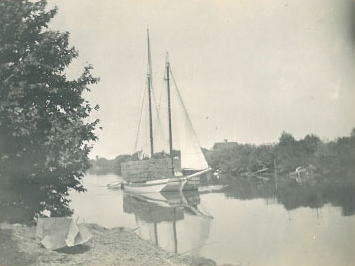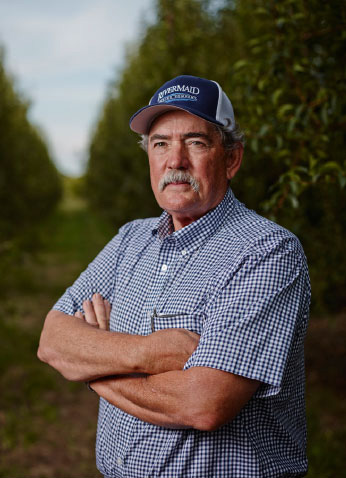CHUCK BAKER
5th Generation River Delta Pear Farmer
Chuck Baker is the fifth generation of his farming family to grow pears along the riverbanks of Sacramento’s Delta pear growing district. His great, great, great grandparents purchased a piece of Delta property in 1872 for $50. This is the same spot where Chuck, and his wife, Joy, still live and farm. His son and two granddaughters (the 7th generation of Bakers) live just down the road. All are surrounded by a working commercial pear orchard that’s over 140 years old.

The river was wild back then with no levees to contain the floodwaters that inevitably came during the winter months. So, when pear harvest concluded for the season, the family fled to higher ground where they joined crowds of gold miners seeking their fortunes. According to Chuck, none of his ancestors ever struck it rich and so they returned to the farm each spring to see what was left of their pear trees after the flood waters receded. It was only after the levees were built and the great world wars hit, that the family was able to settle in to full-time farming on the Delta. The wars, in particular, created tremendous demand for canned fruit and the hey-day of the River Delta pear began.
Today, Chuck still owns and farms the original 30-acre orchard purchased in 1872. In addition, he is hired to farm another 600 acres of pears for other landowners throughout the Delta. Sadly, there are far fewer acres of pears today than there were just a few years ago. Demand for canned pears is greatly reduced and large pear operations in the Northwestern U.S. capture much of the fresh pear market. According to state records, in 1999 nearly 309,000 tons of California pears were harvested. By 2014 volume was less than half that at just over 142,000 tons. Chuck’s grown son and daughter have careers in the agricultural field, but neither of them are famers. Just who will take over the farm is something that worries Chuck. “I don’t want to be the last one in my family to farm this ground.”

“We have to take better care of our trees than we used to,” he said. “Pear volume tended to be cyclical with big crops coming only every other year. Then we realized it was because farmers were accustomed to taking off for vacation immediately after harvest was finished. Now, we stay around and make sure the trees and soils are replenished with nutrients and water. This really helps to produce a good volume of fruit every year.”
To say that local pear farmers lovingly care for their trees is no exaggeration. They have to. For them, sustainability is not just a trend– it’s the way they farm their land, and a way of life. River pears would not have lasted this long without the care and attention they’ve received through five generations of farmers like Chuck Baker. All we can say is — thank you, Chuck.
